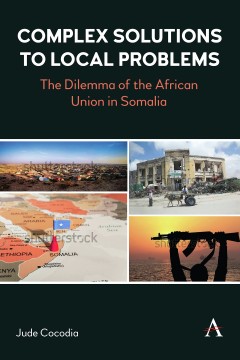Complex Solutions to Local Problems
Constructed Narratives and External Intervention in Somalia’s Crisis
By Jude Cocodia
Other Formats Available:
- About This Book
- Reviews
- Author Information
- Series
- Table of Contents
- Links
- Podcasts
About This Book
This book is divided into three sections.
The first section examines the political relationships/structures of Somalia’s clans with focus on the pre–Siad Barre era. Somalis are largely one people further linked by one religion (Sunni Islam). Establishing their connectivity is crucial in view of this project’s contention that Indigenous methods of conflict resolution that have so far worked in the north (Somaliland and Puntland) can work in the south-central regions where conflict still pervades.
The next section examines the conflict in Somalia from events leading to the exit of Siad Barre (the point where the conflict really begins) and the growth of the Aristocratic/Gerontocratic system of government in the north to address the situation. It will capture the rise of the Islamic Courts Union (ICU) in the south-central areas whose aim was the stability of the regions under their control. The gains, gaps and setbacks of these Indigenous systems will also be discussed in this section.
The third section captures the intervention of Ethiopia and the United States in Somalia’s conflict and how the African Union (AU) was drawn into the fray to legitimize this intervention. Here the book deals with the following (research) question: Should the AU have gone ahead with the intervention plans of the US/Ethiopia that were directed at debilitating the ICU, or, should focus have been directed at supporting local structures put in place by the ICU to foster stability as had been done in the north by the clan elders? This section discusses the current state of affairs in view of what was forfeited.
Reviews
“This timely book is based on a critique of international and regional intervention in the Somali crisis by the AU, UN and neighbouring states. Its strength lies in its analysis of the limitations of international intervention in Somalia by pointing to its inability to resolve the crisis. The book poses a critical challenge to the dominant paradigm of conflict resolution and peace intervention, by raising fundamental questions about the hegemonic interests underlining external intervention in Somalia. This forms a well-informed basis for advocating an effective and more viable homegrown alternative to the problematic external interventions. It offers a brilliantly articulated Pan-African perspective on the salience of indigenous conflict resolution mechanisms to the quest for building sustainable peace on the continent.” —Cyril Obi, Programme Director, African Peacebuilding Network, Social Science Research Council (SSRC), New York, USA.
“Drawing from the extant literature and media reporting on the persisting crises in Somalia, the author provides us with a nuanced and compelling argument about the limitations and perils of military intervention in the resolution of African conflicts. Using the African Union Mission in Somalia (AMISOM) as a case study, Dr Cocodia effectively unpacks the ‘dangers of a single story’ in which dominant Western narratives present Somalia as an irredeemable African tragedy; despite the fact that the northern provinces of Puntland and Somaliland have established stable indigenous social and political orders. Resolving African conflicts, the author persuasively contends, requires serious engagement with traditional conflict resolution mechanisms; as demonstrated by the Islamic Courts Union (ICU) in central Somalia. This is a valuable scholarly contribution that adds to our understanding of the intractable Somali crises and the path to the restoration of peace.” —Dauda Abubakar, PhD, Professor, Political Science & African Studies, University of Michigan-Flint, USA.
“The book, Complex Solutions to Local Problems: Constructed Narratives and External Intervention in Somalia’s Crisis, inquires into the crab-hole web of Somalia’s crisis and critically analyses the matrix between contrived narratives and foreign intervention. The author meticulously interrogates Somalia’s sociopolitical substructure and unveils the multidimensional challenges confronting the quest for enduring or sustainable solutions. Through keen insight and fine analytical skills, the book sheds light on how external actors define narratives and make tensions worse. The book is a sure read for policymakers, scholars, students and peace practitioners who seek to understand the complex and deep-seated conflict in Somalia.” —Ibaba Samuel Ibaba, Professor, Dean, School of Postgraduate Studies, Niger Delta University, Nigeria.
Author Information
Dr. Jude Cocodia is a professor of the Niger Delta University, Nigeria, and a research fellow of the University of the Free State, South Africa.
Series
Anthem Studies in Peace, Conflict and Development
Table of Contents
Preface; Acknowledgements; List of Abbreviations; 1. Introduction; 2. The International Media and Security in Africa: Doctored Reportage and Dire Outcomes; 3. The Miscalculation of the AU, the Radicalisation of Al-Shabaab; 4. What Should Have Been; 5. Charting Its Course; Post Script. Reflections on Peace in Somaliland 2022–2023; References; Index
Links
Stay Updated
Information
Latest Tweets



